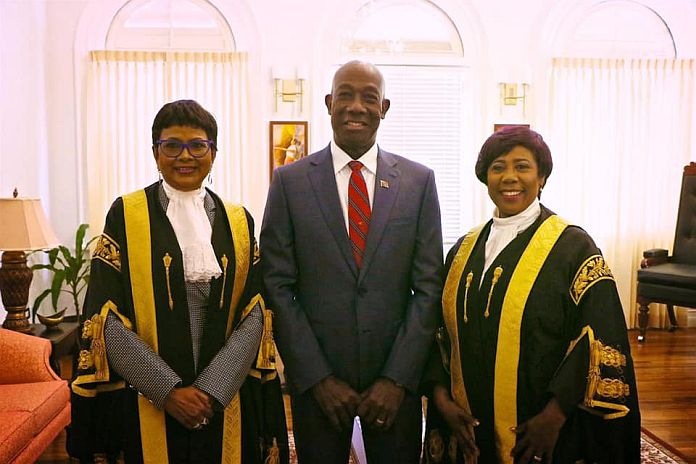Dear Sir
Both Senate president Christine Kangaloo and House Speaker Bridget Annisette-George have turned our parliament into their own kindergartens.
Under their tenure, open robust debate is dead. Both supposedly impartial referees are more involved in the cut and thrust of debates than elected members. They are way too intrusive, too involved, always in your face and have become micro-managers of the debating process.
After five and a half years, it is abundantly clear that Kangaloo and Annisette-George – do not understand their role and functions. Instead of being impartial, ensuring the orderly flow of business, parliamentary rules and traditions, maintaining order and most importantly, defending the rights and privileges of members, including the right to freedom of speech and the right of all members to be heard, Kangaloo and Annisette-George behave as though the parliament is an extension of Balisier House.
They are the Peoples National Movement (PNM) members first and foremost and they employ obvious tricks to impose their edicts on opposition members.
Why the need for their continuous interventions, instructing members of parliament incessantly even on decibel levels, grudgingly giving leeway to government parliamentarians as they develop their arguments and circumscribe speakers with narrow and subjective interpretations of relevance, tedious repetition and Lord knows what.
The first trick is to insist that speakers stick only to specific clauses in the legislation under debate. No context is allowed. No history of the topic discussed. No comparisons. Only the literal words. “Stick to the clauses” they both admonish unsmilingly.
How often have we heard, “I am giving you a little leeway… tie your comments in.” Is that really the role of referees?
Firstly, they limit speakers to two or three clauses or how many are under review, the second strategy is to accuse second or third speakers of tedious repetition. What a clever way to stymie debates.
The third way in which debates are curtailed is the cleverest. While opposition speakers are on the floor, the supposed referees stand to admonish government members who on cue whisper loudly to one another. This intervention gives the impression that the referees are on the side of the opposition. The reality is that the member on the floor loses precious minutes.
The fourth-way debate is restricted is by limiting speaking time to 20 minutes. That is the dictum of the executive. Where the referees are complicit is by encouraging, facilitating spurious standing order interventions and not granting “injury time”.
“Question Time” has now become a farce and total sham.
Why is it that Kangaloo and Annisette-George have the final say in what type of question an opposition member can ask, how it is scripted and whether, according to their dictates, it should even be allowed?
Which is it really – with the Kangaloo and Annisette-George – political bias, inexperience, or merely a woman thing?
I have nothing against women but Oh Lord, they need to cool it – relax themselves – and allow the discussions to continue uninterruptedly. I believe firmly in gender equality but research shows that the first-generation women leaders tend to be overly aggressive, obnoxious, in your face and rule with an iron fist.
Former British prime minister Margaret Thatcher and Israel prime minister Golda Meir come to mind. They did this because they feared that they would not have been taken seriously and overcompensated. The second generation of women leaders tends to act normally since they have nothing to prove. We urgently need second-generation women Speakers of the House and presidents of the Senate. Our two female referees are just too much.
I am tempted to ask if they have something personal against strong, powerful men? Our psychologists may help us in this regard.
Are Kangaloo and Annisette-George not aware that parliament is a place where robust debate must prevail and their job is too merely facilitate, not stymie discussions, not lead it, not circumscribe it? They must be seen and not heard.

In Westminster styled parliaments, opposition members must have their say because governments always have their way. It is for voters to decide whether a member of parliament is being irrelevant, boring, or speaking too loudly. Not an unelected referee dependent on executive patronage for their salaries.
That is how it is supposed to be. That is how it is in Canada, the US, Germany, India, South Africa and in 99 percent of democracies. Not in the Red House in Port of Spain.
Trinidad and Tobago’s parliament today has become a kindergarten. “Miss” is in charge and whatever “Miss” says must go.
Notice how often Annisette-George and Kangaloo invoke edits like, “I rule, take a walk and take your seat”. Why this drama? Why this overcompensation?
No wonder debates in Trinidad and Tobago are moving to the streets. Citizens have figured out that what occurs in Parliament does not reflect realities on the ground.
Trinidad and Tobago urgently need constitutional reform. One of the first fundamental changes required will be to elect the House Speaker and Senate president by a two-thirds majority of sitting members. That way, both referees become creatures of the membership of their respective houses and not beneficiaries of patronage from the executive. The sooner the better.
Under Kangaloo and Annisette-George, our parliament is now a total sham, a national embarrassment and not the seat of democracy anymore.
Capil Bissoon





